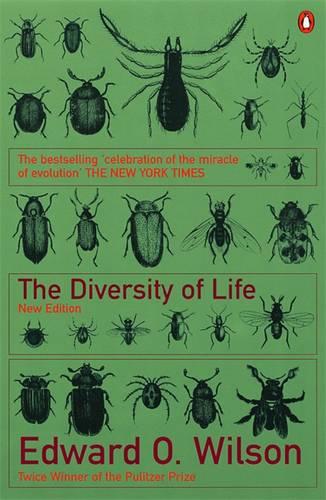
I was put off reading this book for at least a quarter of a century by first trying to read Edward O Wilson’s On Human Nature, which I soon abandoned. It wasn’t my cup of tea at all. I was only prompted to dig out my unopened copy of The Diversity of Life after Wilson’s death was announced in December 2021, when a naturalist friend assured me I would love it.
The Diversity of Life is an excellent book. The first half is packed full of fascinating science concerning evolution, speciation, extinction, biodiversity and the creation of ecosystems. Being reasonably well-read on these subjects, I was pleasantly surprised at how much new information I picked up, and at the many new perspectives I gained on familiar ideas. Wilson is excellent at describing the complex interactions that govern the natural world, making biology a far less clear-cut science than, say, physics. As he puts it:
Such is the dilemma of evolutionary biology. We have problems to solve, we have clear answers—too many clear answers. The difficult part is picking out the right answer. […] What we understand best about evolution is mostly genetic, and what we understand least is mostly ecological. I will go further and suggest that the major remaining questions of evolutionary biology are ecological rather than genetic in content.
The second half of The Diversity of Life is a call to arms to mitigate the damage our species is doing to the biodiversity of our planet. Wilson rightly objects to the earth being treated as a limitless resource to be exploited in the name of economics. But he appreciates such objections are unlikely to get him very far. Instead, he makes the pragmatic case that we need to recognise the economic wisdom of preserving natural resources:
Biodiversity is our most valuable but least appreciated resource. […] Proponents of the New Environmentalism act on this reality. They recognize that only new ways of drawing income from land already cleared, or from intact wildlands themselves, will save biodiversity from the mill of human poverty. The race is on to develop methods, to draw more income from the wildlands without killing them, and so to give the invisible hand of free-market economics a green thumb.
Thirty years after The Diversity of Life was first published, the cynic in me can’t help thinking we haven’t got very far recognising the economic importance of biodiversity. Short-termism always seems to trump more strategic thinking. But I think Wilson was right that the best hope for the future of our planet is, somehow, to give free-market economics a greener thumb. The question is how? But we need to find a way:
In amnesiac revery it is also easy to overlook the services that ecosystems provide humanity. They enrich the soil and create the very air we breathe. Without these amenities, the remaining tenure of the human race would be nasty and brief.
The Diversity of Life is an important book on a vitally important subject. I’m glad I finally got round to reading it. I just wish more economists and business-leaders would do the same.
- Buy this book from Bookshop.org (UK) and help tax-paying, independent bookshops.
- Buy this book from Amazon.co.uk
- Buy this book from Amazon.com